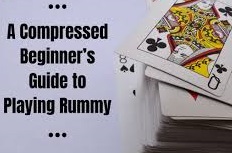Rummy for Beginners, Rummy is a classic card game that combines skill, strategy, and a bit of luck. Whether you’re new to the game or looking to brush up on your skills, this guide is designed to help beginners understand the basics, learn fundamental strategies, and navigate their initial games with confidence.
Understanding the Basics of Rummy
Rummy is typically played with two to six players and involves forming sets (three or four cards of the same rank but different suits) and sequences (three or more consecutive cards of the same suit). The objective varies depending on the variant but generally involves scoring points by melding cards into valid sets and sequences.
Getting Started: Rules and Gameplay
1. Card Dealing and Melding:
- Each player is dealt a set number of cards from a standard deck (usually 52 cards).
- Players must arrange their cards to form valid sets and sequences.
- A valid declaration requires at least one pure sequence (a sequence without a joker).
2. Turn Structure:
- On their turn, players draw a card from the open deck or the closed deck (discard pile).
- They then must discard one card to the discard pile.
3. Objective and Winning:
- The primary goal is to arrange all cards into valid sets and sequences.
- The first player to declare with a valid hand wins the game and scores points based on the remaining cards in their opponents’ hands.
Essential Strategies for Rummy Noobs
1. Focus on Pure Sequence:
- Start by forming a pure sequence early in the game. This sequence should not involve any jokers and is essential for a valid declaration.
2. Use of Jokers:
- Jokers can be used strategically to complete sets and sequences. However, they cannot be used in the formation of a pure sequence.
3. Observation and Discard Strategy:
- Pay attention to the cards your opponents are picking and discarding. This can give you clues about their game plan and help you adjust your strategy accordingly.
4. Plan Ahead:
- Think several moves ahead. Anticipate which cards you might need and plan your melds accordingly to avoid picking up cards that could hinder your progress.
5. Practice Regularly:
- Like any skill-based game, practice is key to improving your rummy skills. Play regularly to familiarize yourself with different strategies and card combinations.
Common Mistakes to Avoid
1. Ignoring Pure Sequence:
- Neglecting to form a pure sequence early in the game can delay your ability to declare, giving opponents an advantage.
2. Hoarding High-Value Cards:
- Holding onto high-value cards without incorporating them into valid melds can result in high penalty points if an opponent declares.
3. Overlooking Opponents’ Moves:
- Failure to observe and adapt to opponents’ strategies can leave you at a disadvantage. Stay vigilant and adjust your gameplay as needed.
Conclusion
Rummy is a game of skill, strategy, and anticipation that offers endless opportunities for enjoyment and improvement. As a beginner, understanding the rules, practicing essential strategies, and learning from each game will contribute to your growth as a player. With dedication and perseverance, you’ll soon find yourself confidently navigating the intricacies of rummy and enjoying the challenges it presents. Embrace the journey from rummy noob to seasoned player, and let each game be a step towards mastering this timeless card game.




